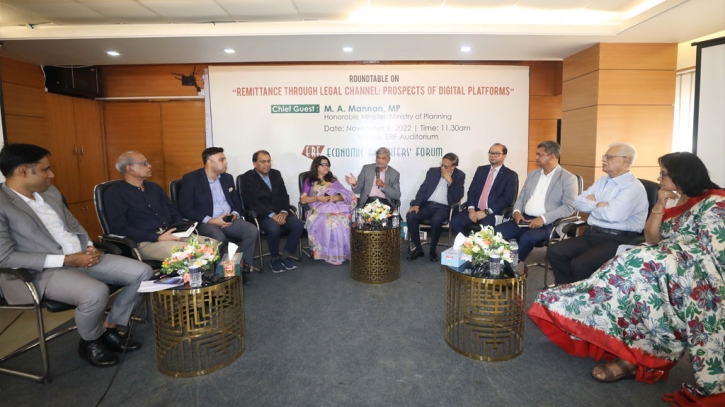Staff Correspondent
Published:2022-11-10 20:02:49 BdST
Digital platforms can be most effective in increasing remittance: Speakers
platforms can be the best medium for making the process of remittance sending significantly easier and ensuring that money sent through legal channels reaches the beneficiary safely and instantly, speakers have said at a seminar.
The seminar on “Remittance Through Legal Channel: Prospects of Digital Platform” was organised by the Economic Reporters’ Forum (ERF) on Wednesday. The seminar was held at the office of the organisation in Purana Paltan of the capital.
Planning Minister MA Mannan was the chief guest of the seminar. Renowned economists, bankers and industry experts put forward various recommendations, said a press release.
Minister MA Mannan said, “To the masses of our country who receive remittances, there is a kind of social distance regarding transactions by going to the bank. As a result, they find it relatively easier to receive remittances from their home even via illegal channels. Remittances cannot be increased unless the distance between expatriates and the legal channels is reduced. The government is working on it. Digital platforms can play a pivotal role in this regard.”
He added, “Transactions with foreign countries are closed for three days a week in the banking channel. For this reason, hundi is being preferred as a better transaction route. The government wants to break these traditional barriers and start a new trend. These issues must be dealt with. The Ministry of Finance and Bangladesh Bank are working on this.”
Ahsan H Mansoor, executive director of Policy Research Institute (PRI) said, “To increase remittances through legal channels, the dollar market needs to be balanced. Migrant workers are more inclined to send remittances via hundi when the dollar exchange rate between legal and illegal channels is high. Through various awareness programs, they can be motivated to send dollars through legal channels. Besides, attention should be paid in increasing digital services.”
Dr Bazlul H Khondker, professor of economics department of Dhaka University and Chairman of SANEM presented the keynote at the seminar.
He said, “In 2019 and 2020, remittance inflow to the country increased by large scale. At that time, the government took various steps including introducing incentives and increasing digital transactions. At present, remittance service costs more than 6 percent globally. It should be reduced. Remitters are choosing hundi because of the convenience of sending money quickly and at a much lower cost. It will be possible to reduce the cost and time by half if digital platforms including MFS are used as legal channel. If the received remittance is cashed out, we will still not be able to maximize the benefit. Rather, if we can strengthen the ecosystem and create ways to use the digital money digitally, the country’s economy will be stronger. For this, digital financial services should be patronized in the country.”
Masrur Reaz, chairman of Policy Exchange said, “Remittance can be brought quickly through digital channels. There is no alternative to using digital platforms to boost remittance inflow. If remittance inflow can be increased, it will be possible to meet the balance of payment deficit.”
Sormindo Nilormi, professor of economics at Jahangirnagar University, said, “If it is possible to facilitate easy and quicker system to send money through digital platform, they will opt for digital channel to send remittance. It is also necessary to recognize the people who earn remittances working from Bangladesh. The definition of migrant workers also needs to sorted out.”
Md Iskandar Mia, former executive director and former deputy head of Bangladesh Financial Intelligence Unit (BFIU), said, “Necessary initiatives should be taken to bring remittance of the illegal migrant workers through legal channel. For that, engaging MFS agents can be a solution. It is also important to take steps to stop money laundering.”
Sheikh Md Monirul Islam (retd), chief external and corporate affairs officer of bKash said, “bKash disburses the remittances instantly to the dear ones of the expatriates. Currently, remittances sent by expatriates from more than 70 countries are entering Bangladesh through 75 Money Transfer Organizations (MTO) via settlement in 12 commercial banks. In 2021, Tk 2,427 crore remittances were disbursed through bKash. At the end of this year, it is expected to reach to around Tk 4,000 crore.”
Mohammed Monirul Moula, Managing Director and Chief Executive Officer of Bangladesh Islami Bank Limited thinks that if the problem of sending remittances by the expatriate workers is lessened, it will be easier to deal with the existing challenge in terms of foreign reserve. If remittances are brought through digital channels, it will be easier to meet the shortage of foreign currency in the next two-three months.
Khondakar Sakhawat Ali, emeritus fellow of Unnayan Samannay said, “The dollar earned by expatriates is grabbed by an unscrupulous group. For this, hundi has to be solved at source level. Besides, remittance through legal channels will be increased if it is possible to introduce the facility of sending remittance directly using MFS for the expatriates.”
Presided over by ERF President Sharmeen Rinvy, the roundtable program was moderated by its General Secretary SM Rashidul Islam.
Unauthorized use or reproduction of The Finance Today content for commercial purposes is strictly prohibited.


